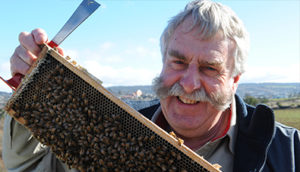Read the latest information on
Foot-and-mouth disease
 Lindsay Bourke, Tasmania’s biggest beekeeper, is on a mission to keep Australia’s honey the best-tasting, purest and safest in the world.
Lindsay Bourke, Tasmania’s biggest beekeeper, is on a mission to keep Australia’s honey the best-tasting, purest and safest in the world.
Lindsay owns Australian Honey Products and is chairman of the Australian Honey Bee Industry Council. At the age of 60, when most people would be looking forward to retirement, Lindsay relaunched his honey career with just 92 hives.
“We are the most threatened agricultural industry in Australia, with no less than twenty separate threats to the survival of Australia’s European bees.”
Lindsay Bourke, Tasmania’s biggest beekeeper, is on a mission to keep Australia’s honey the best-tasting, purest and safest in the world. The owner of Australian Honey Products manages 3000 hives and produces 250 tonnes of honey every year, a large portion of it organic.
His bees pollinate 80 crops of fruit and vegetables, and his multi award-winning honey is processed and extracted in a Launceston heritage building which once housed a maternity hospital. But it is for his implementation of best practice biosecurity measures to ensure food safety that Mr Bourke has made the shortlist for the prestigious Biosecurity Farmer of the Year award.
Ten years ago, Mr Bourke supported a group of concerned apiarists who established B-QUAL, a national, independently audited food safety accreditation system for the honey industry.
“The requirements of the yearly assessment and certification for B-QUAL are stringent,” Mr Bourke says.
“You have to have the records to identify where the honey was collected from and the history of the bees that produced it.”
Ninety percent of Australia’s honey is now extracted under the strict food hygiene conditions of B-QUAL and Lindsay Bourke would like to see every beekeeper participate.
“There are over 1800 larger beekeepers in Australia who produce most of the honey,” he says.
“But there are more than 8000 small beekeepers, many with just a few hives, who sell at farmers’ markets and such places. We’re trying to get as many of them as we can into B-QUAL because they have to understand that honey is a food, which has to be produced under strict extraction procedures.”
Duncan Rowland, Manager of Biosecurity Planning and Implementation at Animal Health Australia, said Lindsay Bourke is one of the rare breed of individuals who demonstrates a deep commitment to biosecurity for both his business and the industry as a whole.
“B-QUAL covers biosecurity best practice for tracing, training and hygiene, and has allowed Lindsay’s company to export honey all over the world,” Mr Rowland said.
“The judges were particularly impressed with the way he has pioneered high-level biosecurity standards among his fellow producers and worked hard to keep our bees safe from biosecurity threats.”
Lindsay Bourke has been at the forefront of protecting Australian bees from the many threats lurking just beyond our borders, first as Quarantine and Disease Chairman, then Chairman of the Australian Honey Bee Industry Council for the past seven years.
“We are the most threatened agricultural industry in Australia, with no less than twenty separate threats to the survival of Australia’s European bees,” he says.
These days, what keeps him awake at night is the Asian honey bee, already established in north Queensland; and especially the destructive mites it is capable of carrying.
“At the moment, Australia is still a honey paradise. We are the last country in the world that doesn’t have Varroa destructor,” Mr Bourke says.
“Honey as an industry is only worth about $80 million a year, but our bees directly pollinate an estimated $4 billion of crops. Some, like apples, pears, cherries and almonds, would be lost without the bees.”
Varroa mites, tiny parasites which feed off honey bee larvae, have destroyed the European bee populations of Papua New Guinea and New Zealand.
“No country that has become infected with Varroa destructor has been able to stop its spread,” Mr Bourke adds.
He is championing the extension of a number of quarantine and surveillance programs aimed at containing the spread of the Asian honey bee and keeping varroa mites out of Australia.
“There was a little bloke called Einstein, and he was pretty good with maths. He worked out that four or five years after the last bee dies so will the last of mankind. And we have so many more people to feed today!”